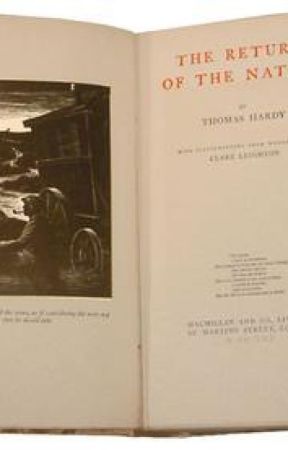While the effigy of Eustacia was melting to nothing, and the fair woman herself was standing on Rainbarrow, her soul in an abyss of desolation seldom plumbed by one so young, Yeobright sat lonely at Blooms-End. He had fulfilled his word to Thomasin by sending off Fairway with the letter to his wife, and now waited with increased impatience for some sound or signal of her return. Were Eustacia still at Mistover the very least he expected was that she would send him back a reply tonight by the same hand; though, to leave all to her inclination, he had cautioned Fairway not to ask for an answer. If one were handed to him he was to bring it immediately; if not, he was to go straight home without troubling to come round to Blooms-End again that night.
But secretly Clym had a more pleasing hope. Eustacia might possibly decline to use her pen—it was rather her way to work silently—and surprise him by appearing at his door. How fully her mind was made up to do otherwise he did not know.
To Clym's regret it began to rain and blow hard as the evening advanced. The wind rasped and scraped at the corners of the house, and filliped the eavesdroppings like peas against the panes. He walked restlessly about the untenanted rooms, stopping strange noises in windows and doors by jamming splinters of wood into the casements and crevices, and pressing together the leadwork of the quarries where it had become loosened from the glass. It was one of those nights when cracks in the walls of old churches widen, when ancient stains on the ceilings of decayed manor houses are renewed and enlarged from the size of a man's hand to an area of many feet. The little gate in the palings before his dwelling continually opened and clicked together again, but when he looked out eagerly nobody was there; it was as if invisible shapes of the dead were passing in on their way to visit him.
Between ten and eleven o'clock, finding that neither Fairway nor anybody else came to him, he retired to rest, and despite his anxieties soon fell asleep. His sleep, however, was not very sound, by reason of the expectancy he had given way to, and he was easily awakened by a knocking which began at the door about an hour after. Clym arose and looked out of the window. Rain was still falling heavily, the whole expanse of heath before him emitting a subdued hiss under the downpour. It was too dark to see anything at all.
"Who's there?" he cried.
Light footsteps shifted their position in the porch, and he could just distinguish in a plaintive female voice the words, "O Clym, come down and let me in!"
He flushed hot with agitation. "Surely it is Eustacia!" he murmured. If so, she had indeed come to him unawares.
He hastily got a light, dressed himself, and went down. On his flinging open the door the rays of the candle fell upon a woman closely wrapped up, who at once came forward.
"Thomasin!" he exclaimed in an indescribable tone of disappointment. "It is Thomasin, and on such a night as this! O, where is Eustacia?"
Thomasin it was, wet, frightened, and panting.
"Eustacia? I don't know, Clym; but I can think," she said with much perturbation. "Let me come in and rest—I will explain this. There is a great trouble brewing—my husband and Eustacia!"
"What, what?"
"I think my husband is going to leave me or do something dreadful—I don't know what—Clym, will you go and see? I have nobody to help me but you; Eustacia has not yet come home?"
"No."
She went on breathlessly: "Then they are going to run off together! He came indoors tonight about eight o'clock and said in an off-hand way, 'Tamsie, I have just found that I must go a journey.' 'When?' I said. 'Tonight,' he said. 'Where?' I asked him. 'I cannot tell you at present,' he said; 'I shall be back again tomorrow.' He then went and busied himself in looking up his things, and took no notice of me at all. I expected to see him start, but he did not, and then it came to be ten o'clock, when he said, 'You had better go to bed.' I didn't know what to do, and I went to bed. I believe he thought I fell asleep, for half an hour after that he came up and unlocked the oak chest we keep money in when we have much in the house and took out a roll of something which I believe was banknotes, though I was not aware that he had 'em there. These he must have got from the bank when he went there the other day. What does he want banknotes for, if he is only going off for a day? When he had gone down I thought of Eustacia, and how he had met her the night before—I know he did meet her, Clym, for I followed him part of the way; but I did not like to tell you when you called, and so make you think ill of him, as I did not think it was so serious. Then I could not stay in bed; I got up and dressed myself, and when I heard him out in the stable I thought I would come and tell you. So I came downstairs without any noise and slipped out."

YOU ARE READING
The Return of the Native (Completed)
ClassicsThe Return of the Native is Thomas Hardy's sixth published novel. It first appeared in the magazine Belgravia, a publication known for its sensationalism, and was presented in twelve monthly installments from January to December 1878. Because of the...
